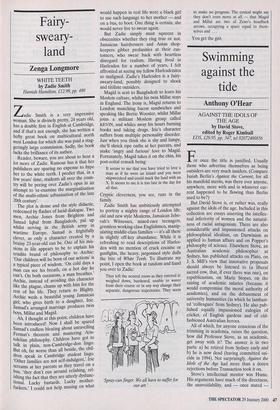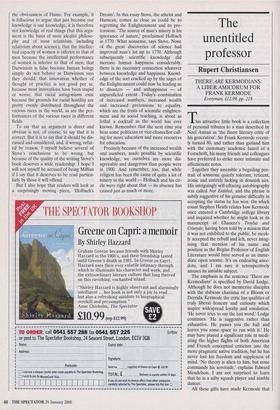Swimming against the tide
Anthony O'Hear
AGAINST THE IDOLS OF THE AGE by David Stove, edited by Roger Kimball EDS, £29.95, pp. 347, tel 02072400856 or once the title is justified. Usually those who advertise themselves as being outsiders are very much insiders. (Compare Isaiah Berlin's Against the Current; for all his manifold merits, was there ever anyone, anywhere, more with and in whatever cur- rent happened to be flowing than Berlin used to be?) But David Stove is, or rather was, really against the idols of the age. Included in this collection are essays asserting the intellec- tual inferiority of women and the natural- ness of racial antagonism. There are also considerable and impassioned attacks on philosophical idealism, on Darwinism as applied to human affairs and on Popper's philosophy of science. Elsewhere Stove, an Australian academic philosopher at Sydney, has published attacks on Plato, on J. S. Mill's view that innovative proposals should always be listened to (a liberal sacred cow, that, if ever there was one), on republicanism, on Marie Stopes, on the raising of academic salaries (because it would compromise the moral authority of academics), and on the debasement of university humanities (in which he lambast- ed 'colleagues' from Sydney). He also pub- lished equally impassioned eulogies of cricket, of English gardens and of old- fashioned Australian heroes.
All of which, for anyone conscious of the trimming in academia, raises the question, how did Professor Stove, as an academic, get away with it? The answer is in two parts: a) he retired from Sydney early and b) he is now dead (having committed sui- cide in 1994). Not surprisingly, Against the Idols of the Age had more than a dozen rejections before Transaction took it on.
Stove's intellectual mentor was Hume. His arguments have much of the directness, the unavoidability, and — once stated — the obviousness of Hume. For example, it is fallacious to argue that just because our knowledge is our knowledge, it is therefore not knowledge of real things (but this argu- ment is the basis of most idealist philoso- phy and of most relativism, including relativism about science); that the intellec- tual capacity of women is inferior to that of men because the intellectual performance of women is inferior to that of men; that Darwinism is false because human beings simply do not behave as Darwinism says they should; that innovation whether of thought or practice is not good per se, because most innovations have been stupid or worse; that racial antagonisms exist because the grounds for racial hostility are pretty evenly distributed throughout the various races in the world, as are the per- formances of the various races in different fields.
To say that an argument is direct and obvious is not, of course, to say that it is correct. But it is to say that it should be dis- cussed and considered, and, if wrong, refut- ed by reason. I myself believe several of Stove's conclusions to be wrong, but because of the quality of the writing Stove's book deserves a wide readership. I hope I will not myself be accused of being Millian if I say that it deserves to be read particu- larly by those it will offend.
But I also hope that readers will look at a surprisingly moving piece, `Holbach's Dream'. In this essay Stove, the atheist and Humean, comes as close as could be to regretting the Enlightenment and its pre- tensions. 'The source of man's misery is his ignorance of nature,' proclaimed Holbach in 1770. What nonsense, says Stove. None of the great discoveries of science had improved man's lot up to 1770. Although subsequently scientific knowledge did increase human happiness considerably, there is no necessary connection whatever between knowledge and happiness. Knowl- edge of the sort cracked up by the sages of the Enlightenment could now be leading us to disasters — and unhappiness — of unparalleled extent. Today's combination of increased numbers, increased wealth and increased pretensions to equality, which are the fruits of scientific enlighten- ment and its social teaching, is about as lethal a cocktail as the world has ever known. Remember that the next time you hear some politician or vice-chancellor call- ing for more education and more resources for education.
Precisely because of the increased wealth and numbers, made possible by scientific knowledge, we ourselves are more dis- agreeable and dangerous than people were in 1900. And remember, too, that while religion has been the cause of quite a lot of misery in the world — Holbach and his cir- cle were right about that — its absence has caused just as much or more.



















































































 Previous page
Previous page